History in the Hot Seat: The Teaching and Knowing of Canada’s Past
July 18, 2024
Hannah Belec

The “History in the Hot Seat: The Teaching and Knowing of Canada’s Past” Project is part of the 2024 Knowledge Synthesis Grant Competition, funded by the Social Sciences and Humanities Research Council (SSHRC) in partnership with Canadian Heritage, Genome Canada, and UK Research Innovation’s Arts and Humanities Research Council (UKRI-AHRC). The theme of the 2024 Knowledge Synthesis Grant Competition, “Evolving Narratives of Cultures and Histories,” aims to assess and mobilize the existing knowledge on how factors such as globalization, war, colonization, racism, slavery, climate change, technology, social media, and more have shaped or changed cultural and historical narratives.
Following the theme and goals of “Evolving Narratives of Cultures and Histories,” the “History in the Hot Seat” Project, in collaboration with the Centre for Human Rights Research and 101.5 UMFM, has produced a podcast series that explores what it means to learn and teach Canadian history, considering ongoing histories of colonialism and Indigenous dispossession.
Episode 1
In the first episode of the “History in the Hot Seat: The Teaching and Knowing of Canada’s Past” Podcast, Dr. Adele Perry, Dr. Jarvis Brownlie, and Dr. Jocelyn Thorpe discuss the project’s objectives, outcomes, and impacts with interviewer Hannah Belec. The group also reflects on historical education and commemoration in Canada before and after the Truth and Reconciliation Commission’s 2015 Report.
Works mentioned in the episode:
- About Phyllis Webstad and the Orange Shirt Society: https://orangeshirtday.org/phyllis-story/
- Whitfield, Harvey Amani. North to Bondage: Loyalist Slavery in the Maritimes. UBC Press, 2016.https://search.lib.umanitoba.ca/permalink/01UMB_INST/1f1g7b3/cdi_proquest_ebookcentral_EBC5331322
- Herstein, H.H., L.J. Hughes, and R.C. Kirbyson. Challenge & Survival: The History of Canada, 1970. https://search.lib.umanitoba.ca/permalink/01UMB_INST/gnigpm/alma99122656420001651
- Menchú, Rigoberta and Elisabeth Burgos-Debray. I, Rigoberta Menchú: An Indian Woman in Guatemala, 1984. https://search.lib.umanitoba.ca/permalink/01UMB_INST/gnigpm/alma99118874220001651
- Frankenburg, Ruth. White Women, Race Matters, 1993. https://search.lib.umanitoba.ca/permalink/01UMB_INST/1f1g7b3/cdi_proquest_ebookcentral_EBC5298946
- Truth and Reconciliation Commission of Canada. Final Report of the Truth and Reconciliation Commission of Canada. Volume One, Summary: Honouring the Truth, Reconciling for the Future, 2015. https://search.lib.umanitoba.ca/permalink/01UMB_INST/gnigpm/alma99148985229201651


Executive Summary: Period Poverty and Equity, On Campus and Beyond
Executive Summary: Period Poverty and Equity, On Campus and Beyond
2024
Author

In 2023, with funding from the Centre for Human Rights Research (CHRR), the Faculty of Arts, and the University of Manitoba’s Strategic Initiatives Support Fund, a group of researchers affiliated with the CHRR came together to explore and address menstrual equity on campus. The “Period Poverty and Equity, On Campus and Beyond” project undertook a campus audit of washrooms to assess availability of menstrual supplies; a survey open to UM students, staff, and faculty; as well as a number of outreach events.
Working towards period equity is not as a charitable endeavour to be ameliorated by donations of period supplies; rather menstrual equity is an issue of justice. Shifting the conversation from period poverty to menstrual justice means asking that all people who menstruate be provided with the resources, tools, and infrastructure to do so with safety and dignity.

“No One is Disposable” with Mostafa Henaway
"No One is Disposable" with Mostafa Henaway
March 2024
Mostafa Henaway
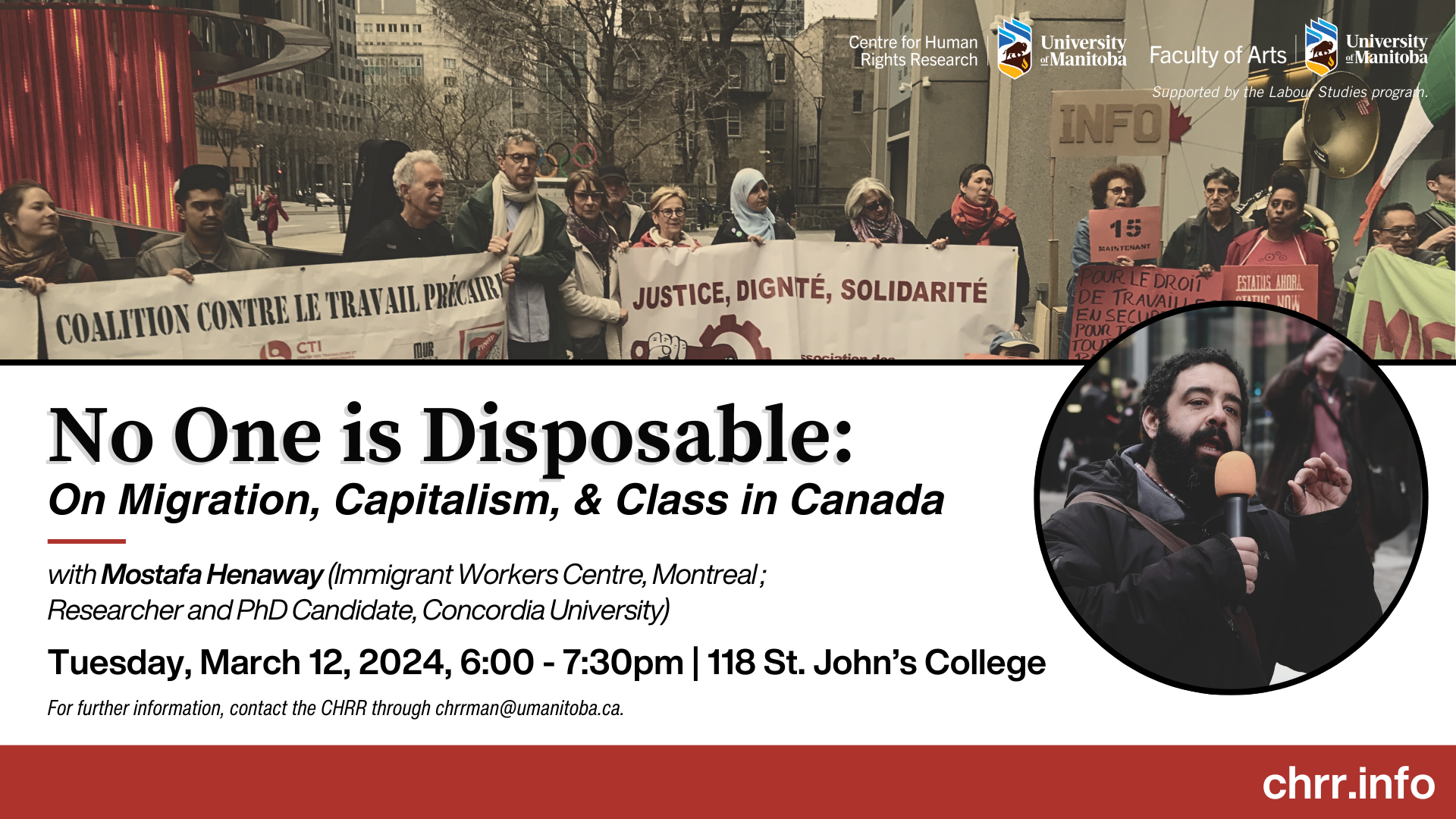
The Centre for Human Rights Research (CHRR) and the Faculty of Arts at the University of Manitoba, hosted Mostafa Henaway (Immigrant Workers Centre – Montreal) for a lecture titled “No One is Disposable: On Migration, Capitalism, and Class in Canada” on March 12, 2024 at the University of Manitoba.
Henaway, a Canadian-born Egyptian, is a long-time community organizer at the Immigrant Workers Centre in Montreal, where he has been organizing for justice for immigrant/migrant workers for over two decades. He is also a researcher and PhD candidate at Concordia University. In his new book, Essential Work, Disposable Workers: Migration, Capitalism and Class, he examines “the massive expansion of precarious work under neoliberalism and how migrant workers are challenging the conditions of their hyper-exploitation through struggles for worker rights and justice.”
Related Resources
Support Us
Whether you are passionate about interdisciplinary human rights research, social justice programming, or student training and mentorship, the University of Manitoba offers opportunities to support the opportunities most important to you.
A Report on Period Poverty and Equity, On Campus and Beyond
A Report on Period Poverty and Equity, On Campus and Beyond
June 2024
Pauline Tennent, et al.
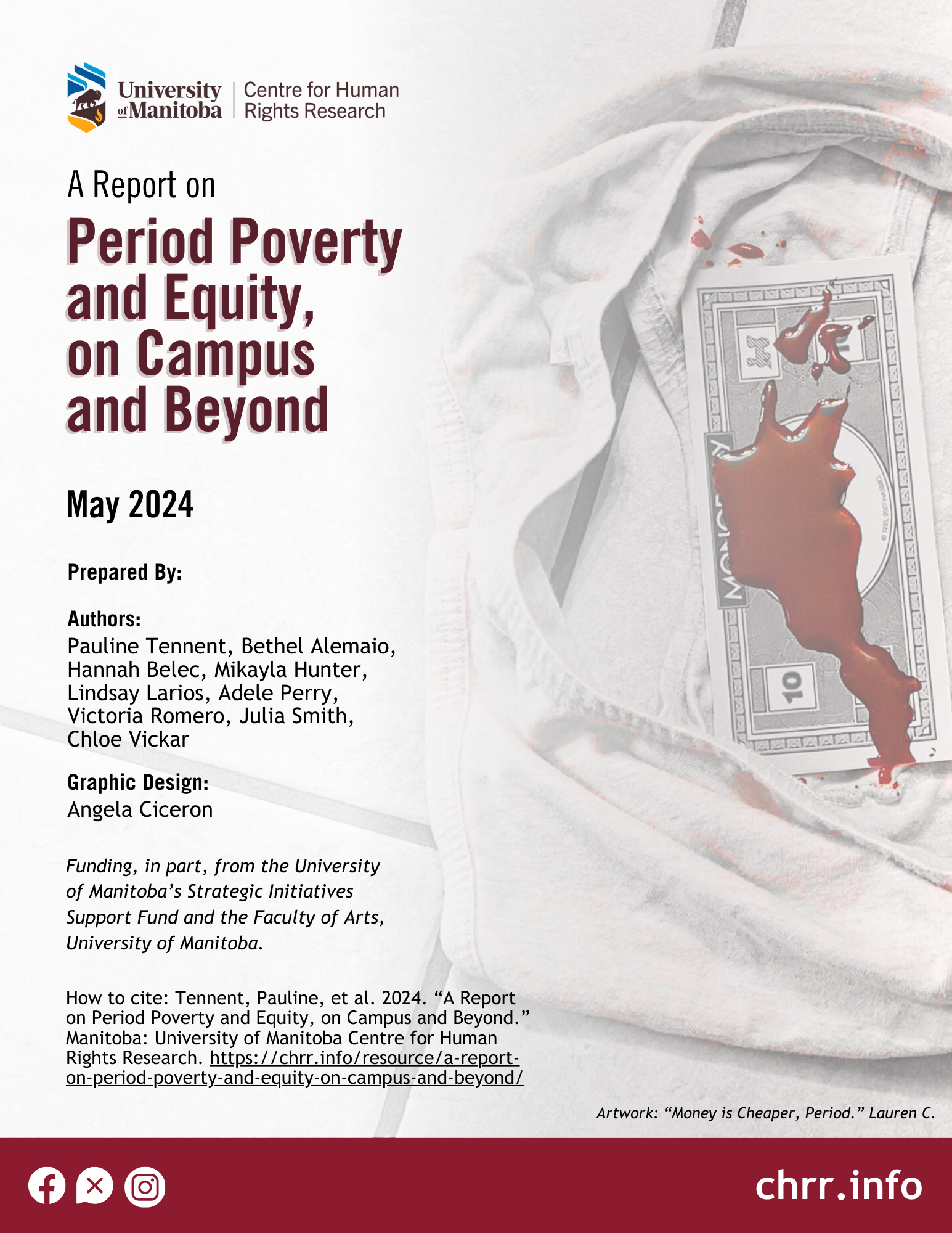
In 2023, with funding from the Centre for Human Rights Research (CHRR), the Faculty of Arts, and the University of Manitoba’s Strategic Initiatives Support Fund, a group of researchers affiliated with the CHRR came together to explore and address menstrual equity on campus. The “Period Poverty and Equity, On Campus and Beyond” project undertook a campus audit of washrooms to assess availability of menstrual supplies, a survey open to UM students, staff, and faculty, as well as a number of outreach events.
Working towards period equity is not as a charitable endeavour to be ameliorated by donations of period supplies; rather menstrual equity is an issue of justice. Shifting the conversation from period poverty to menstrual justice means asking that all people who menstruate be provided with the resources, tools, and infrastructure to do so with safety and dignity.
Related Resources
Support Us
Whether you are passionate about interdisciplinary human rights research, social justice programming, or student training and mentorship, the University of Manitoba offers opportunities to support the opportunities most important to you.
Solidarities + Connections with Palestine: A Podcast
Solidarities + Connections with Palestine: A Podcast
June 6, 2024
Centre for Human Rights Research
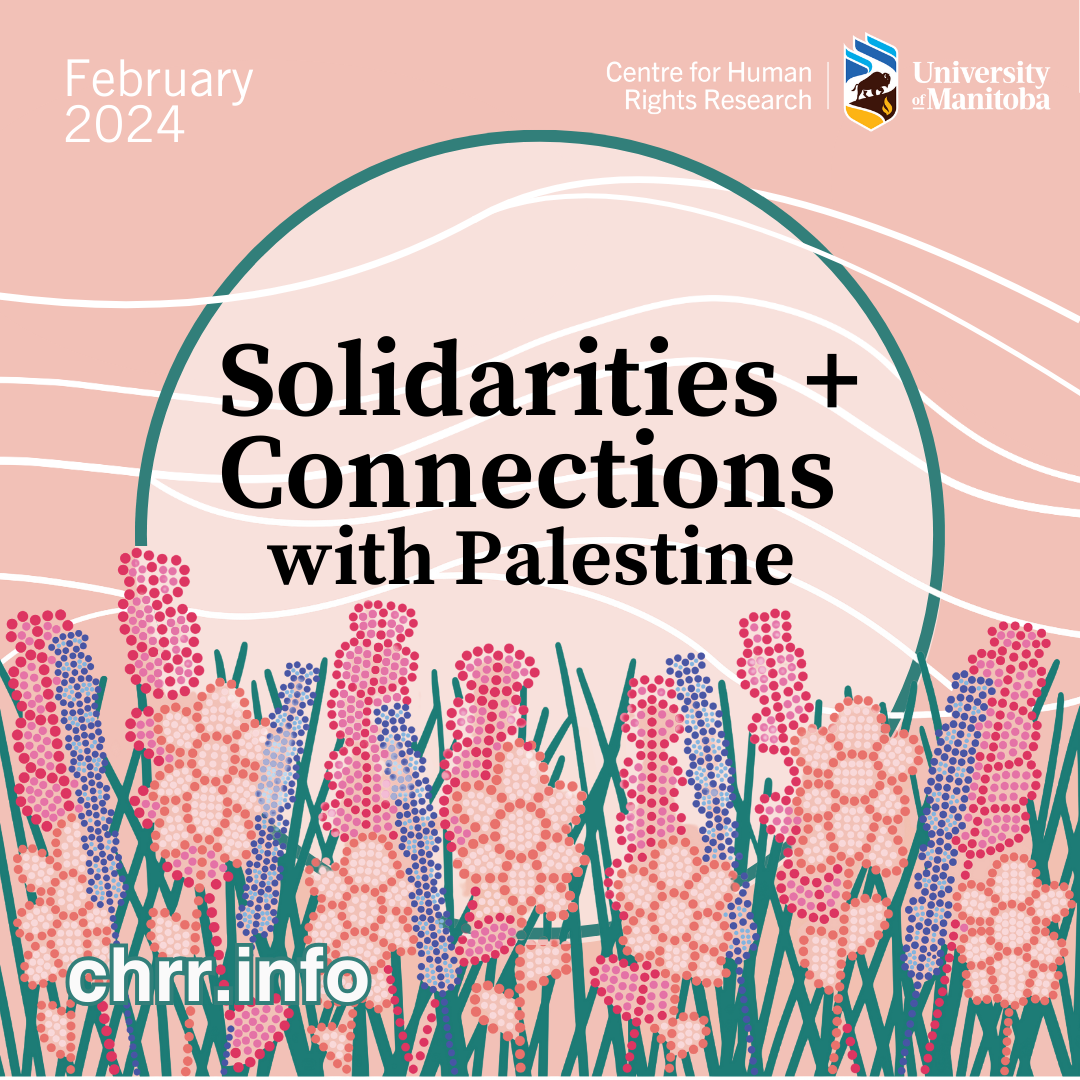
Since the Nakba in 1948, countless Palestinians have been permanently displaced from their country due to the establishment of the state of Israel on Palestinian land. As of May 29, 2024, 36,171 Palestinians have been killed since October 2023 due to the genocide in Gaza, with approximately 1.7 million people being displaced (UN OCHA).
On February 28, 2024, the Centre for Human Rights Research held a virtual panel on Solidarities and Connections with Palestine . The panel sought to identify and develop connections between Treaty 1 and Palestine and we were honoured to host Winnipeg Centre MP Leah Gazan, Independent Jewish Voices Harold Shuster, University of Ottawa’s Alex Neve, and University of Toronto’s Youcef Soufi. Ethel Tungohan also joined the conversation. This conversation reminded us that is a crucial time for individuals, communities, and institutions to stand firmly for human rights — including the rights of people to live free of the human rights violations and international crime that have marked decades of occupation and violence in Israel and Palestine. Our latest podcast is drawn from the conversations from this webinar. Access the podcast at Spotify, Amazon Music, or iHeart Radio.
Artwork: “Wāpikwanīya (Flowers)” by Carly Morrisseau

An Event in Honour of Red Dress Day with Cambria Harris
An Event in Honour of Red Dress Day with Cambria Harris
May 2, 2024
Cambria Harris

The content in this video may be difficult and/or triggering. If you or someone you know needs emotional assistance related to this topic or the information in this article, help is available 24/7 through the MMIWG Support Line, 1-866-413-6649.
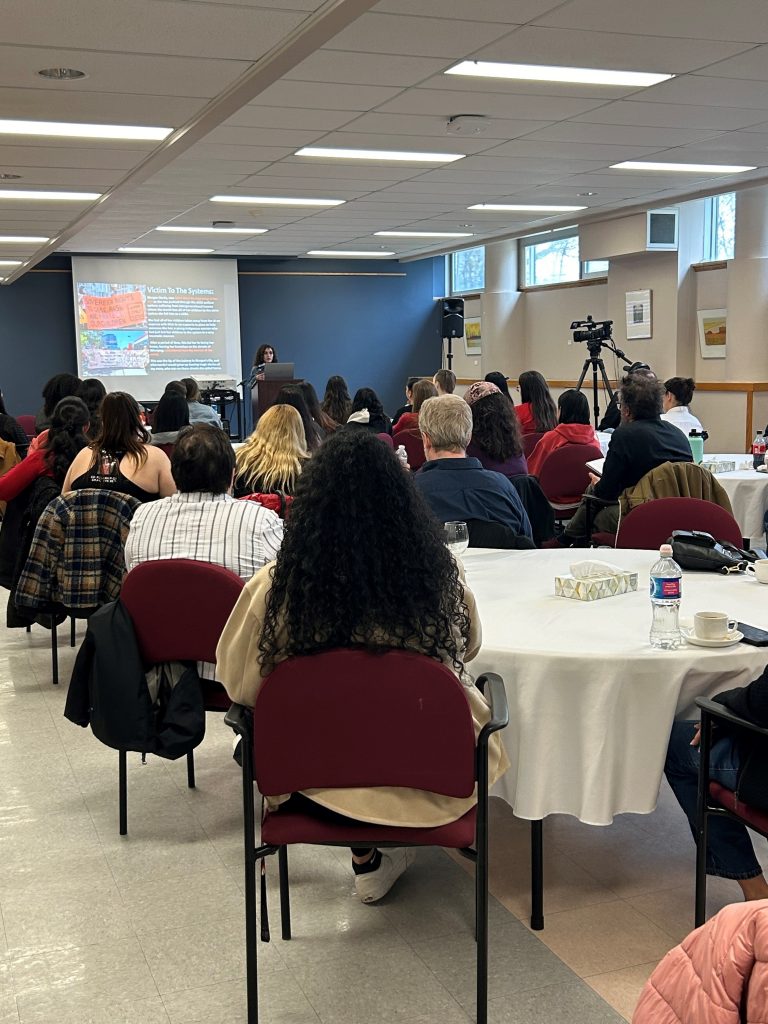
On Thursday, May 2nd, 2024, Indigenous Engagement and Communications, the Department of Indigenous Studies, the Margaret Laurence Endowment Fund (Women’s and Gender Studies) and the Centre for Human Rights Research at the University of Manitoba were honoured to host Cambria Harris for an event in honour of the National MMIWG2S+ Awareness Day, or Red Dress Day.
The name ‘Red Dress Day’ is inspired by the work of Métis artist Jamie Black who began The REDress Project in 2010 to raises awareness about the thousands of missing and murdered Indigenous Women, Girls, and 2SLGBTQQIA+ Peoples. It began as an art installation that hung hundreds of empty red dresses in public spaces to remind people of the First Nations, Métis, and Inuit women and girls lost because of gender-based violence.
Read more about the Calls to Justice.

Migrant Reproductive Justice: Perinatal and abortion care with precarious immigration status with Dr. Lindsay Larios
Migrant Reproductive Justice: Perinatal and abortion care with precarious immigration status with Dr. Lindsay Larios
April 2, 2024
Dr. Lindsay Larios
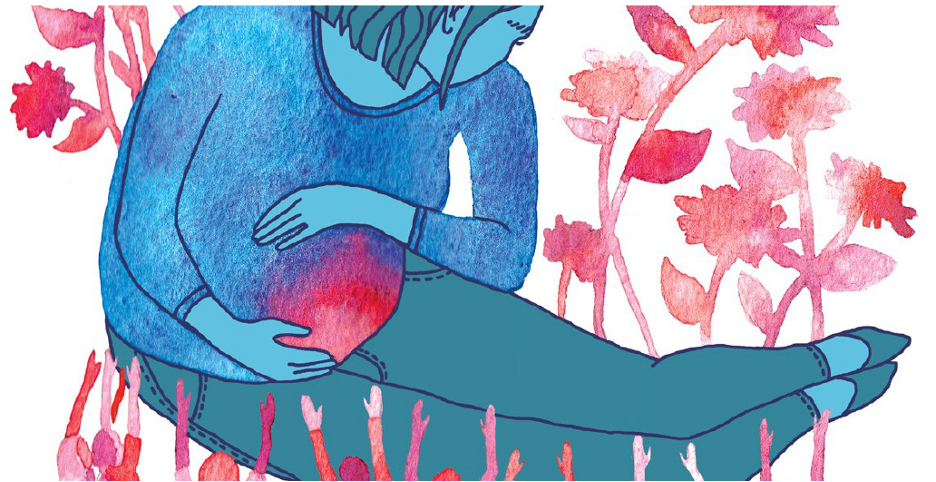
On April 2, 2024, the Centre for Human Rights Research (CHRR) hosted Dr. Lindsay Larios (UManitoba) for a seminar titled “Migrant Reproductive Justice: Perinatal and abortion care with precarious immigration status.”
Dr. Lindsay Larios is an interdisciplinary critical policy researcher and assistant professor of social work at the University of Manitoba. She studies citizenship and immigration in the Canadian context, in particular, as it intersects with family and reproductive politics and policies. Her most recent work focuses on the politics of pregnancy and childbirth and precarious migration as an issue of reproductive justice.
This seminar is a part of our annual Critical Conversations seminar series. This year, the seminar series focused on the CHRR’s research theme Reproductive and Bodily Justice and explored histories of the body, reproduction, and care in Canada and beyond.

The Right to Clean Water in First Nations: The Photovoice Project (2nd Edition)
The Right to Clean Water in First Nations: The Photovoice Project (2nd Edition)
April 2, 2024
Colin Bonnycastle

The right to water and sanitation remains a key focus and modern day human rights issue in Canada. Indigenous communities in Canada are overrepresented with respect to poor water quality and water advisories. Protecting Indigenous rights to water and sanitation is best done by community grassroots approach.
This Photovoice project stems from a 2011 SSHRC Partnership Development Grant led by Prof. Karen Busby (Principal Investigator) and Colin Bonnycastle (Co-Investigator). Nisichawayasihk Cree Nation and the students and staff at Atoskiwin Training & Employment Centre of Excellence Centre (ATEC) created a Photovoice Project to bring awareness to the impacts of unsafe drinking water and sanitation practices in Indigenous communities.
The research remains crucial today as communities continue to advocate for access to clean drinking water.
Related Resources
Support Us
Whether you are passionate about interdisciplinary human rights research, social justice programming, or student training and mentorship, the University of Manitoba offers opportunities to support the opportunities most important to you.
Migrant Justice and Human Rights: A Resource Guide
Migrant Justice and Human Rights: A Resource Guide
April 2024
Angela Ciceron
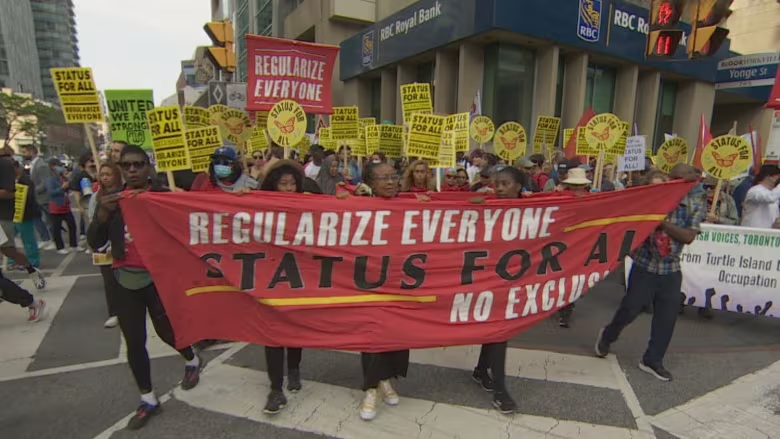
In March 2024, the Centre for Human Rights Research hosted Mostafa Henaway, a long-time community organizer with Immigrant Workers Centre in Montreal. Henaway’s work emphasized the structural and transnational issues propelling migrant workers to undertake precarious work under neoliberal capitalism, as well as efforts made by migrants to resist these structures. This resource guide aims to expand on this conversation by providing resources on the experiences of migrant workers under neoliberalism and their role in Canadian society more broadly.
Related Resources
Support Us
Whether you are passionate about interdisciplinary human rights research, social justice programming, or student training and mentorship, the University of Manitoba offers opportunities to support the opportunities most important to you.
Care Activism in Canada: Migrant Domestic Workers, Dissident Friendships and Decolonial Care
Care Activism in Canada: Migrant Domestic Workers, Dissident Friendships and Decolonial Care
March 19, 2024
Dr. Ethel Tungohan and Diwa Marcelino
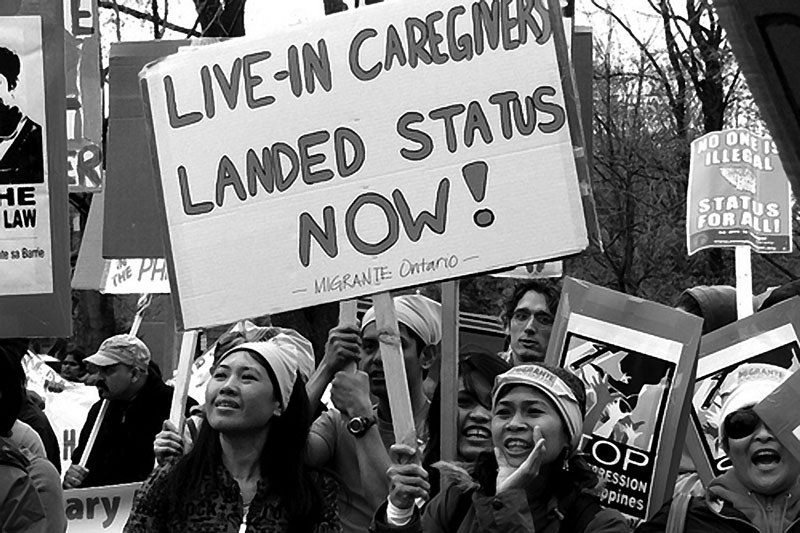
Dr. Ethel Tungohan in conversation with Diwa Marcelino, Migrante Manitoba
In collaboration with the Global College – University of Winnipeg, the Centre for Human Rights Research (CHRR) at the University of Manitoba hosted Dr. Ethel Tungohan (York University) for a seminar titled Care Activism in Canada: Migrant Domestic Workers, Dissident Friendships and Decolonial Care. Dr. Tungohan was in conversation with Migrante Manitoba representative and community organizer Diwa Marcelino.
Ethel Tungohan is a Canada Research Chair in Canadian Migration Policy, Impacts and Activism and an Associate Professor of Politics at York University in Toronto, Canada. Her book, “Care Activism: Migrant Domestic Workers, Communities of Care, and Movement Building,”, won the National Women’s Studies Association First Book Prize. Her research looks at social movements, immigration policy, social and public policy, and Canadian and comparative politics.
Diwa Marcelino is a community organizer with Migrante Manitoba, a grassroots organization advancing the rights and welfare of overseas Filipinos within the framework of peoples’ struggle for democracy, justice & peace in the Philippines. Migrante Manitoba is a founding member of Health Care for All Manitoba, an alliance advocating for expanded public health care coverage to include all residents of Manitoba regardless of status. During the Freedom Convoy occupations in 2022, he became the national project manager for the Community Solidarity Project, a civil society response to rise of the politics of division and hate. He is also a founding member of Community Solidarity Manitoba. He is also the vice-chairperson of the Council of Canadians, a grassroots organization challenging corporate power and advocating for people, the planet and our democracy. He is also a steering committee member of KAIROS, an ecumenical organization promoting ecological justice and human rights.
This seminar is a part of our annual Critical Conversations seminar series. This year, the seminar series focused on the CHRR’s research theme Reproductive and Bodily Justice and explored histories of the body, reproduction, and care in Canada and beyond.

Contact Us
We’d love to hear from you.
442 Robson Hall
University of Manitoba
Winnipeg, Manitoba
R3T 2N2 Canada
204-474-6453
Quick Links
Subscribe to our mailing list for periodic updates from the Centre for Human Rights Research, including human rights events listings and employment opportunities (Manitoba based and virtual).
Land Acknowledgement
The University of Manitoba campuses are located on original lands of Anishinaabeg, Cree, Ojibwe-Cree, Dakota and Dene peoples, and on the National Homeland of the Red River Métis.

